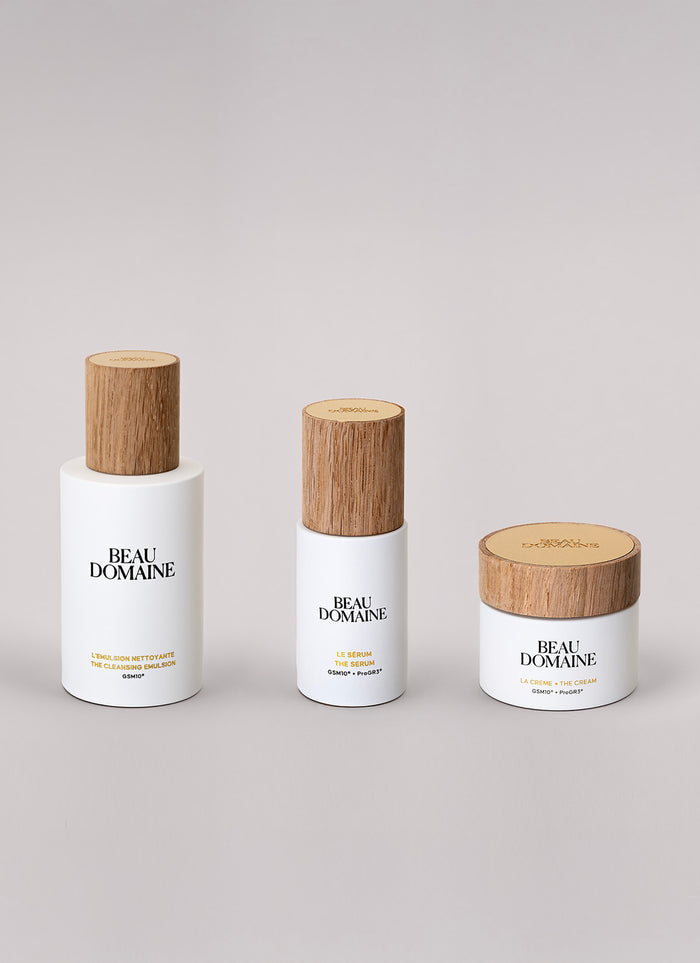BEST SELLER


Some Common Signs of Dry Skin
Dry skin occurs when the skin loses its natural moisture and is unable to retain it. Recognizing its symptoms is the first step in addressing this common concern.
Dry skin feels uncomfortable, particularly after cleaning it. Individuals with dry skin may experience itching, flakiness, and a feeling of tightness. Make-up doesn't hold very well. And the skin might lack radiance. On the eye contour, forehead and cheeks, fine surface lines begin to appear. In short, skin needs to be soothed, comforted, nourished and moisturized.
Understanding the Main Causes for This Condition
Several factors contribute to the development of dry skin. It's crucial to understand the underlying conditions that may contribute to dry skin to tailor an effective treatment plan.
Environmental conditions, such as low humidity or harsh winds, can upset the skin barrier. During winter particularly, the air becomes drier, causing the skin to lose moisture. Indoor heating can worsen this condition.
Skin aging, as we grow older, skin tends to be more prone to dehydration.
Some habits, like the excessive use of hot water, or the use of aggressive skincare products, can strip the skin of its natural oils, leading to dryness.
Damage to the skin barrier: a damaged or unbalanced skin barrier makes it difficult for the skin to retain moisture, making it more prone to dryness and irritation.
Underlying health conditions, like atopic dermatitis, a chronic inflammatory skin condition, can be associated with dry, itchy skin.
How to Prevent Dry Skin
Prevention is key when it comes to maintaining healthy, moisturized skin.
Regularly moisturize: Using a quality moisturizer is essential to keep your skin hydrated. Look for products containing ingredients such as hyaluronic acid, glycerine or ceramides to lock in moisture.
Avoid long hot showers : Opt for lukewarm water when showering, and limit the time spent in the shower to avoid over-drying the skin.
Use a humidifier: Adding a humidifier to your indoor environment can help maintain adequate humidity levels in the air, thus preventing skin dryness.
Skin Barrier Protection: Using products that help repair the skin barrier, such as those containing niacinamide or fatty acids, can benefit long-term skin health.
Treating Dry Skin
An effective treatment plan for dry skin involves a multifaceted approach.
First, choosing an appropriate moisturizer is crucial. Look for products containing ingredients that enhance the skin's ability to retain moisture, such as hyaluronic acid and glycerine. Applying the moisturizer immediately after bathing helps lock in moisture.
Moreover, repairing the skin barrier is essential in treating dry skin. Products containing ceramides, which are natural components of the skin barrier, can aid in restoring and strengthening the skin's protective layer. For individuals with atopic dermatitis, topical treatments may be prescribed by a dermatologist.
During winter, it's crucial to use richer moisturizers, wear protective clothing, and stay hydrated to combat the effects of the harsh weather on the skin.
It is important to take care of your skin with a holistic approach. On top of choosing the appropriate skin care products, don’t forget to drink enough water, and to include sufficient fatty acids (oily fish, oilseeds, etc.) in your diet.
A Morning Routine to Keep Dry Skin Moisturized
Cleaning: use a gentle, moisturizing cleanser, preferably soap-free, specially formulated for dry skin (such as a cream, foam or a cleansing milk like The Cleansing Emulsion by Le Domaine). Avoid aggressive cleansers with sulfated surfactants, which can remove your skin's natural oils and alter the surface hydrolipidic film.
Toner: Opt for a toner specially designed for dry skin. Look for products containing moisturizing ingredients such as hyaluronic acid, aloe vera, glycerine or nourishing plant extracts. Avoid toners that contain alcohol, as this can further dry out the skin.
Treatment: Continue your routine with a serum (choose it depending on your needs: anti-wrinkle prevention, anti-aging, firmness, radiance, hydration…for any question regarding serums, don’t hesitate to take a look at our article explaining what a skin serum is, and how to use it.Then apply your eye contour care (adapted to your needs: anti-dark circles, anti-puffiness, anti-wrinkle, moisturizing...)
Moisturizer: Choose a cream with a rich, creamy texture suitable for dry skin, containing moisturizing ingredients such as hyaluronic acid and glycerine, and nourishing ingredients such as olive oil and shea butter.
A Night Routine to Repair Dry Skin
Cleaning : Opt for a cleansing oil, balm or milk to remove all make-up while retaining moisture.Then apply your moisturizing toner, to remove all residuals.
At night, choose a serum that acts to repair the skin and increase its natural ability to recharge, like The Serum by Beau Domaine. You can then apply your eye contour cream.
Before bedtime, it's best to focus on skin regeneration and repair. Opt for a richer moisturizing cream to help skin regenerate during the night, with a "plumped-up" effect when you wake up, like The Cream by Beau Domaine.
Remember to exfoliate your skin once a week to help remove dead skin cells and promote better absorption of moisturizing products. However, choose a gentle, non-irritating exfoliant (mechanical scrub with very fine grains or peeling). Follow with a nourishing mask to combat dehydration and restore skin suppleness.
In summary, understanding the causes, symptoms, and effective treatment for dry skin is essential for maintaining a healthy and hydrated complexion. By addressing environmental factors, choosing the right skin care routine, and adopting preventive measures, you may help prevent or treat dry skin. If symptoms persist or worsen, consulting with a dermatologist is advisable to develop a personalized treatment plan for optimal skin care.


